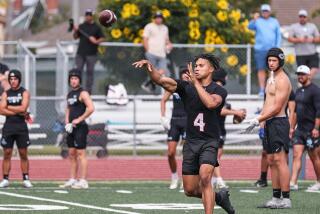Football Still on Hold for Titans : Colleges: Cal State Fullerton president says he won’t decide what to do until after he sees state budget in January.
- Share via
FULLERTON — Cal State Fullerton President Milton Gordon said Friday he will not decide whether to revive football at the school until he has an idea what next year’s state budget will be. And that will probably make it impossible for the Titans to put together a team for the 1994 season.
Fullerton was hoping to create a Division I-AA program after dropping the sport as a Division I-A entity last winter, and budget money is set aside to pay a football coach from Jan. 1 through the second half of the current fiscal year.
The problem is that Gov. Pete Wilson will not unveil the 1994-95 budget until Jan. 15, and Gordon says he probably won’t know until then if the money to sustain football will be available.
By mid-January, however, the deadline for assembling a program might be past. Typically, a coaching vacancy is posted and the screening process can take at least a month--usually longer--before the position is filled. But any such delay in naming a staff would cripple recruiting efforts, which culminate for most schools with the beginning of the national signing period Feb. 2.
“Certainly, if we go beyond a certain point in the year, the (football) question is moot,” Gordon said. “There won’t be time to put together a team, a coaching staff and a support staff. . . .”
Said Athletic Director Bill Shumard: “I would be hopeful to have a head coach on board in January to begin the process (of building a program). That would be a logical deadline for us to try and field a team in the fall of 1994.”
Gordon says he understands the problems involved with waiting but that economic realities leave him little choice.
“The budget has undergone a 23% to 24% reduction during the last three years,” he said. “I think it would be foolish for anybody to be taking action (on football) without having at least a good estimate of the budget.”
And the current situation, Gordon said, does not allow for an accurate early forecast.
“Until the last three years, we had a pretty good idea (of the budget’s contents) by December,” Gordon said. “The governor released the budget in January and it was pretty much adhered to.
“In the last three years, the changes have been just radical--from coming out in January with a positive budget and ending up with a negative. You can’t get more radical than that.”
So the calendar apparently will make the decision for Fullerton--at least in terms of resuming the program next year.
Because of past budget woes, Fullerton, starting in 1987, began playing football “money games” at such places as Georgia, Clemson, Florida, Mississippi State, Louisiana State and Auburn. The Titans were clearly out-manned, but collected six-figure guarantees. Gordon said he does not want to find the school in the same situation in the future.
“I’m clearly holding up the process because I’ve said several times, if there’s not a (positive) budget, we’re not going to go forward,” he said. “I don’t want to be caught in the situation we had the last few years of I-A. I don’t think it’s fair to the students, the coaches or the university. Any athlete who enters the field of competition likes to feel he has a chance to win. That’s part and parcel for athletic competition.”
Making matters worse for the prospect of football returning soon is the shriveled size of the current budget. Each existing sport was asked last spring to take a 10% reduction in 1993-94. Men’s basketball, for example, was forced to trim its budget by $45,000.
And although Fullerton students voted this week to increase their fees by $14 a semester to aid Titan athletics, Gordon cautioned not to read “football” into that referendum.
“I don’t know the impact--it’s too early,” Gordon said. “Some tried to link the fee referendum to football, which it’s not. Chris Lowe (president of Associated Students) did a great job of making that distinction.”
The fee will begin in the fall of 1994 and will raise more than $500,000 a year for the athletic department, but it isn’t as if a large part of the student body was attempting to send a message: Only 699 students--out of 22,600 on campus--voted during a two-day span this week.
Another issue facing Fullerton and any attempt to bring back football is the California State University system’s recent agreement with the National Organization for Women, which set gender equity guidelines. Within five years, the percentages of males and females participating in athletics must be within 5% of the makeup of the student body.
As of Oct. 15, males constituted 54% of athletic participants at the school, but women made up more than 50% of the student body. Adding football, always a university’s largest men’s program, would widen the gap.
Gordon, though, said that if football does not return next fall, he will not rule it out in the future.
“If it doesn’t come back next year, does it mean it will not come back the following year?” Gordon asked. “Certainly not. . .
“I try to understand the frustration of others but, what some don’t understand is that an athletic program is a costly venture. Funds have to be there, not just interest. There has to be interest and funding. Otherwise, you just can’t have it.
“If someone out there wants football and is willing to put in $500,000 a year, we sit here and they can call me--or Bill Shumard, or (Gordon’s assistant) Judith Anderson.”
More to Read
Get our high school sports newsletter
Prep Rally is devoted to the SoCal high school sports experience, bringing you scores, stories and a behind-the-scenes look at what makes prep sports so popular.
You may occasionally receive promotional content from the Los Angeles Times.






